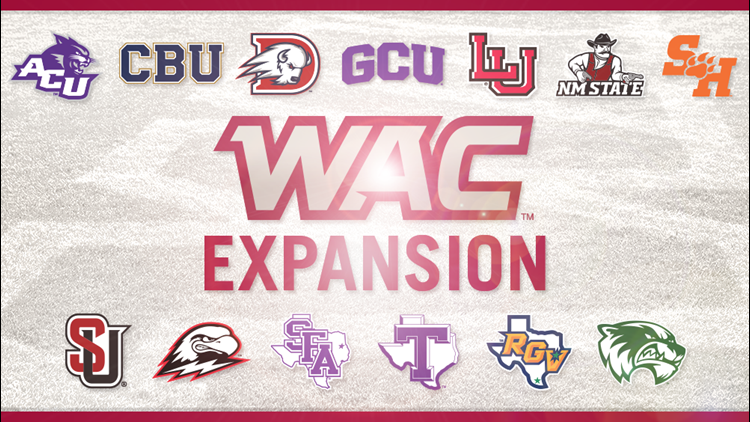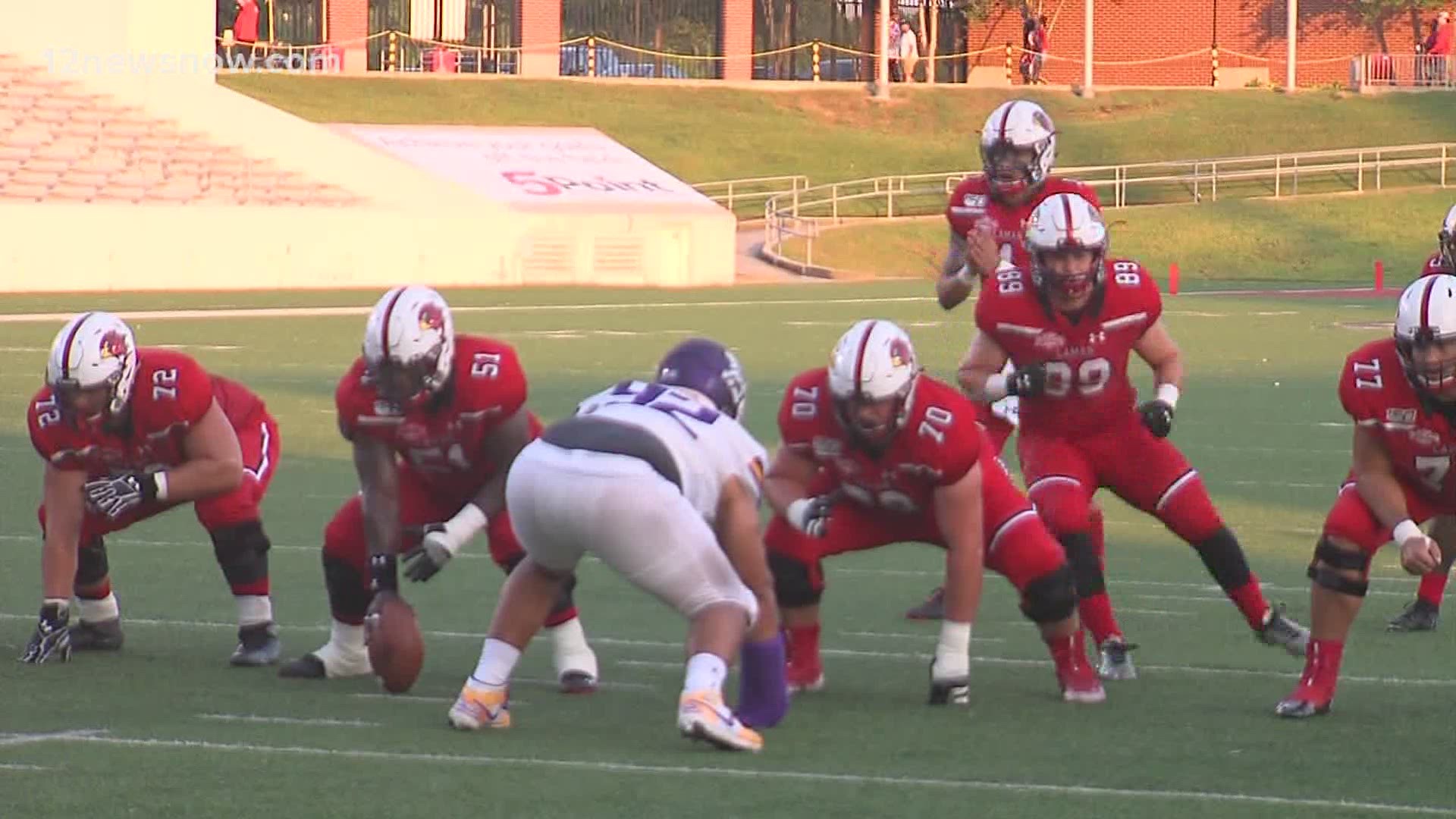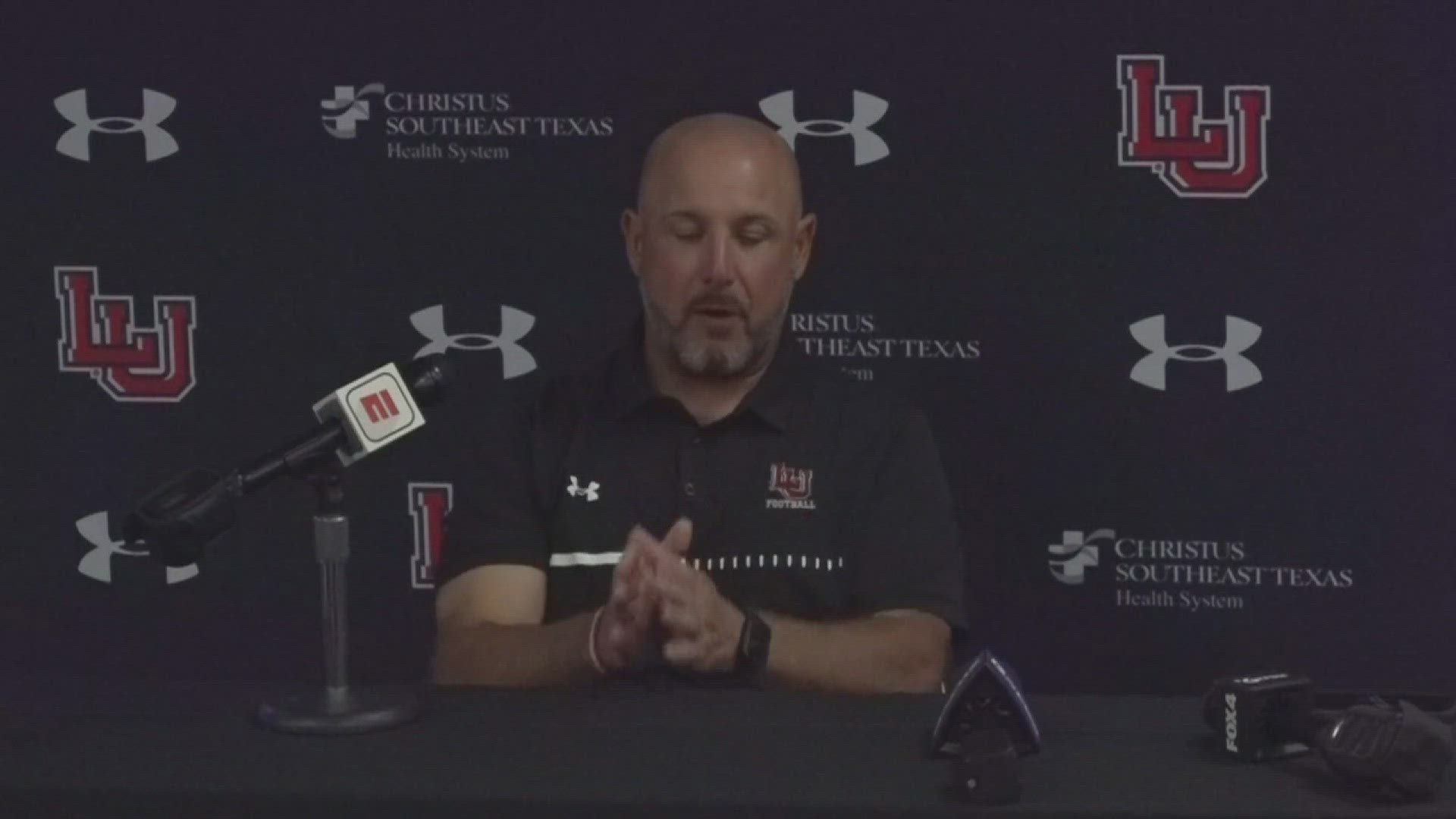HOUSTON — Western Athletic Conference Commissioner Jeff Hurd today announced membership invitations issued by the conference‘s Board of Directors to five universities have been accepted effective July 1, 2022.
Hurd also announced the WAC’s intention to reinstate football at the Football Championship Subdivision level beginning with the 2022 season.
Four of the institutions – Abilene Christian University, Lamar University, Sam Houston State University and Stephen F. Austin State University – are in Texas and currently are members of the Southland Conference. The fifth, Southern Utah University, is a member of the Big Sky Conference.
The additions will create a 13-team conference that will be divided into two divisions for team sports other than football, men’s basketball and women’s basketball. One division will consist of the Texas-based institutions including current WAC members Tarleton State University and The University of Texas Rio Grande Valley. The other division will include Southern Utah along with Dixie State University, New Mexico State University, Grand Canyon University, California Baptist University, Seattle University and Utah Valley University.
“I cannot overstate my level of excitement in making this expansion announcement,” said Hurd, “The opportunity to bring five quality institutions into the conference, to significantly strengthen the WAC’s national basketball brand and other championship sport profiles, and to bring football back under the WAC umbrella is one that made sense.”
“The end result could not have been accomplished without the collaboration and shared visions of the WAC’s Board of Directors and the Presidents of the incoming institutions. It not only stabilizes the conference for the future; it also positions it for significant growth and success.”
The addition of football will bring to 20 (10 men’s and 10 women’s) the number of sports in which the WAC will sponsor championships. Divisional play only will be held for baseball, softball, volleyball, men’s soccer and women’s soccer with championship tournaments held at the conclusion of each of the conference seasons.
Men’s and women’s basketball will feature both divisional and crossover play with the number of conference games to be played still to be determined. The conference’s tournament will remain in Las Vegas.
The new members, along with Dixie State and Tarleton, will give the WAC seven full-time members that play in, or are transitioning to, the Football Championship Subdivision. It is anticipated that at least one more football-playing member will be added, but a timetable has not yet been established.
The WAC previously sponsored football at the Football Bowl Subdivision from 1962 until 2012. Seven Pro Football Hall of Famers played in the WAC and the conference boasts 43 NFL First Round picks.
- WAC –
About Abilene Christian University
Abilene Christian University enrolls more than 5,200 students each year from 46 nations. Founded in 1906, it is one of the largest private universities in the Southwest and the highest-ranking school in Texas in a 2020 U.S. News & World Report benchmark focused on student success. It is widely known as one of the most innovative universities in the nation. No intercollegiate athletics program in the state of Texas – at any level – can claim as many national championships as ACU, which has won 64 team titles since 1952. Of them, 57 have come at the NCAA Division II level, the fifth-most NCAA national championships in history behind only UCLA, Stanford, USC and NCAA Division III swimming powerhouse Kenyon College.
About Lamar University
With over 16,000 students, Lamar University is a research institution serving Southeast Texas and beyond with more than 100 programs of study leading to bachelors, masters and doctoral degrees. LU is a member of the Texas State University System and accredited by the Southern Association of Colleges and Schools Commission on Colleges. The 300-acre campus located 90 miles east of Houston and 25 miles west of Louisiana, is recognized for the quality of its core curriculum, diversity of its student body and low student-to-faculty ratio, which is 19:1. The history of the athletics program dates all the way back to the 1923 football season, and it currently supports 17 men’s and women’s varsity sports.
About Sam Houston State University
Named for Sam Houston, Texas’ greatest hero, Sam Houston State University continually strives to honor its historical roots through academic excellence that includes exceptional teaching from faculty. For more than 139 years, SHSU has been preparing students for meaningful lives of achievement. Its motto, “The measure of a Life is its Service,” resonates among its 21,500-plus students and echoes across eight colleges and beyond its Huntsville roots. The Bearkats have won 67 Southland Conference championships during their time in the league and in 2014, the department claimed its first NCAA Division I National Championship when the bowling team defeated Nebraska. Bearkat teams have participated in the NCAA postseason championships 35 times while 35 individuals have advanced to the NCAA Indoor and Outdoor Track and Field Finals.
About Stephen F. Austin State University
Stephen F. Austin is a comprehensive institution located in Nacogdoches, Texas which is dedicated to excellence in teaching, research, scholarship, creative work and service. Founded in 1923 as a teacher’s college, SFASU now boasts an enrollment of nearly 13,000 students across six colleges with over 120 different majors or areas of study. The SFA Athletic department competes in NCAA Division I athletics as a current member of the Southland Conference. With more than 400 student-athletes competing across 18 varsity sports teams, the ‘Jacks have built a proud reputation for athletic success both regionally and nationally. SFA has amassed 90 conference championships as well as four national championships in its competition history.
About Southern Utah University
Established in 1897, Southern Utah University evolved from a teacher training institution to Utah’s designated masters university, offering more than 140 undergraduate programs and 21 graduate and certificate programs. With world-class, project-based learning, unique undergraduate research opportunities, and a personalized learning environment (19:1), students lead projects mentored by professors. True to the University’s core vision, SUU faculty, staff and administrators enable students to honor thought in all its finest forms, achieve excellence in their chosen field, and create positive change in the world.
About the Western Athletic Conference
The WAC was formed in 1962 and is comprised of nine member institutions – California Baptist University; Chicago State University; Dixie State University; Grand Canyon University; New Mexico State University; Seattle University; Tarleton State University; The University of Texas Rio Grande Valley; and Utah Valley University. Abilene Christian University, Lamar University, Sam Houston State University, Stephen F. Austin State University and Southern Utah University will be joining the WAC in 2022. The WAC crowns team and individual champions in 19 sports – nine men’s and 10 women’s championships. The WAC office is in the Denver metropolitan area.
Frequently Asked Questions
Are all current institutions remaining in the WAC?
Eight of the nine members will remain. Chicago State University voluntarily will exit following the 2021-22 academic year. Following is a statement from CSU President Zaldwaynaka Scott:
"Since joining the conference in 2013, Chicago State University has been a proud member of the Western Athletic Conference. When the WAC added six member-institutions in 2013, including Chicago State, the original concept was to develop a Midwest division with Chicago State and University of Missouri – Kansas City as the anchors for potential Midwest WAC expansion. With UMKC’s departure in 2020 and the recent WAC expansion in southern and southwestern states, Chicago State’s membership is no longer geographically sustainable. Thus, with assistance and support from the conference, Chicago State is voluntarily ending its membership on June 30, 2022. Chicago State has enjoyed its time in the WAC and is looking forward to finding new membership."
Was this move made specifically for football?
It was not. The re-introduction of football to the conference is just one of the results of the expansion. The opportunity to improve the WAC’s already strong national basketball brand was another critical reason for it, and it will promote an improved NCAA Tournament presence in both participation and seeds. The WAC also strives to be well-rounded, and the additions strengthen numerous team and individual men’s and women’s sports the conference will sponsor. Perhaps most importantly, new and current members have a shared vision to shape the conference’s future.
Will the WAC have an automatic qualification to the NCAA FCS Championship Playoffs?
NCAA bylaws state that a conference must have six active Division I members that sponsor the sport in which automatic qualification is sought. Because Dixie State University and Tarleton State University are considered re-classifying institutions to Division I until the 2024 season, the WAC will consider the addition of at least one more football-playing institution for 2022-23 or the following year.
Does the WAC have plans to eventually become an FBS conference again?
There is no established timetable or plan for such a move as a conference, but there is an agreement among the football-playing institutions to commit to an analysis of all the implications of such a move. It also will be important to monitor the national football landscape for any potential changes that could occur.
How will men’s and women’s basketball be scheduled?
The format and number of conference games to be played still is to be determined by the new administrative groups. It is expected that divisional crossover games will be included in the schedules.
How will divisional play be scheduled?
It is expected that divisional play will be conducted in either a single or double round-robin format. With input from the respective head coaches of each sport, the new administrative groups ultimately will make the determination.
What will be the format and locations for conference championships?
Both will be determined once the new administrative structure is put into place. It is anticipated the conference basketball tournaments will remain in Las Vegas. It also is the expectation there will be an equal divisional geographic distribution and/or rotation of most, if not all, of the remaining championships.
How does the expansion result is cost savings for members?
Divisional play only will be instituted for the majority of men’s and women’s team sports. It is the key to cost savings as the distance between opponents will be less for nearly all institutions. A division currently consisting of the six Texas institutions has an average one-way distance of 304 miles between campuses, compared with 320 miles in their current conference. In the other division the average distance between institutions will be 684 miles compared with 1,134 miles in the current WAC format.
How does expansion help the conference in sports other than football?
The restructured WAC would have changed the average national ranking for conference teams substantially in recent years. Over the previous three fully completed years, the average team ranking of the WAC’s future structure would have improved by 20 spots in men’s basketball, 45 spots in women’s basketball and 24 spots in baseball.
What other benefits does the expansion provide?
The new WAC will have members located in high-growth, warm weather areas that are either nearby or in metropolitan markets. As such it enhances university-wide exposures, increases recruiting territories for all member institutions and promotes long-term sustainability and growth. Nine of the members are located in two of the nation’s fastest growing states since 2010 (Texas and Utah).
Why is this announcement being made in Houston?
NRG Stadium in Houston was selected in honor of the Battle of Piney Woods, an annual football game between Sam Houston and Stephen F. Austin, one of the oldest rivalries in the state of Texas and, the fact that four of five new members are in the state.




